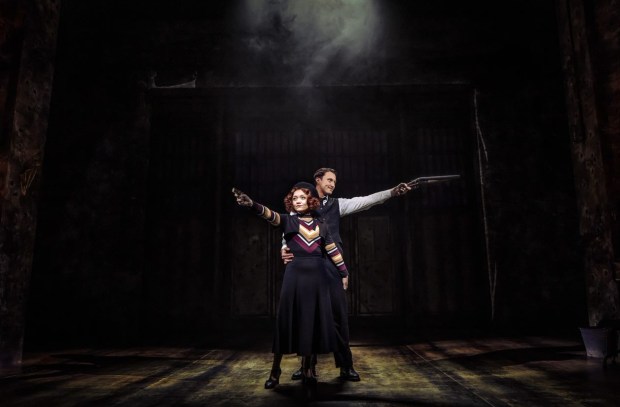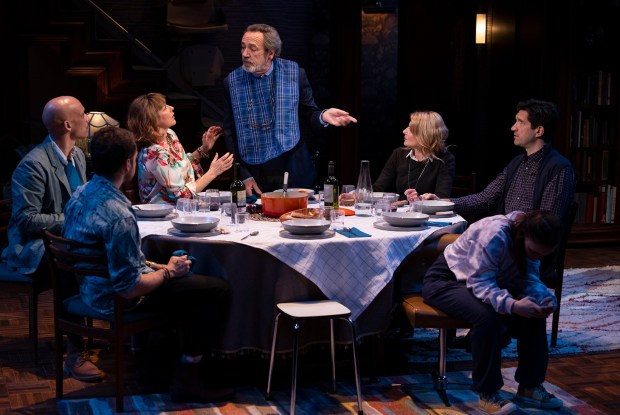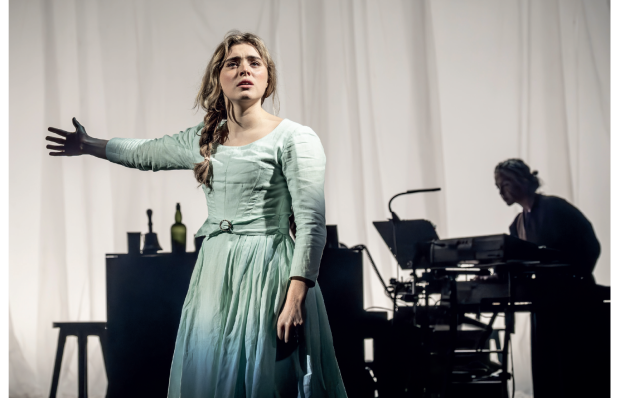In the 1990s, the BBC had a popular flat-share comedy, Men Behaving Badly, about a pair of giggling bachelors who were scolded and dominated by their mummy-substitute girl-friends. The author, Simon Nye, has written a historical crime caper about the theft of the crown jewels in 1671, as Charles II prepared to celebrate his tenth year on the throne.
The psychological co-ordinates of the play are poorly handled. The thief, Colonel Blood, is an irritating Irish crosspatch who wants to drive the hated English from his homeland. Charles (played by Al Murray) is more attractive, a fun-loving gadabout who enjoys sex, jokes and science and who can’t bear Puritans. So the audience sides with the King and hopes that Blood’s vindictive scheme will fail.
This is a serious mistake to make at the start of a crime comedy: the audience should be rooting for the criminals. Blood dresses up as a parson and asks to inspect the jewels, which are kept in a locked room guarded by an incompetent old soldier (also played by Al Murray). The robbery ought to be simple but the crooks are even stupider than the bumbling guard whom they stab and beat with a mallet. The heist fails, the thieves are discovered and all are sentenced to death. The story delivers a couple more twists and then the curtain falls.
There’s barely enough material here for a sketch show let alone a full-length play and the script is padded out with meandering scenes and underdeveloped characters. Blood’s gang includes a hysterical actress who loves showing off and improvising absurdly melodramatic scenes for no reason. It’s a brilliant comic idea to embed such an unreliable character within a group of thieves who are engaged in a complex and dangerous crime but the opportunity counts for nothing. The attention-seeking actress is written out of the script as soon as her comic potential has been established.
The show’s best moments are generated by Murray, who uses his experience as the Pub Landlord to engage with the audience and improvise gags which, as usual, focus on his dislike of England’s continental neighbours. Mel Giedroyc, playing a sex-starved French aristocrat, also does a spot of banter with the crowd and pretends to flirt with men twice her age. Neil Morrissey has a walk-on role as a pompous courtier and Carrie Hope Fletcher plays a screeching teenage nuisance. Forgettable stuff. The presence of these big names may suggest that the producers lost faith in the script and hired a lot of celebs to shore up the box office. It may work.
The Pillowman stars a fine comic actor, Lily Allen, who has great natural stage presence. Martin McDonagh’s drama borrows its plot and atmosphere from Pinter’s short play One for the Road. A writer in a fascist state, played by Allen, is interrogated by two violent detectives who suspect her of inspiring a spate of child murders. Meanwhile the writer’s brother, in a nearby cell, is being roughed up by another secret policeman. Or is he? The script likes to spring surprises by presenting an act of brutality and then revealing that it was fake.
It takes ages for the story to go nowhere, and the flimsy dialogue includes this gem: ‘The first duty of a storyteller is to tell a story.’ Yes, and the first duty of a bore is to deliver a tautological platitude. In any case, the script barely qualifies as ‘a story’ because the main character doesn’t face a mission that becomes a crisis and eventually resolves itself. The show just follows a handful of garrulous characters as they prattle about torture and occasionally carry it out. The scene shifts occasionally from the police station to a suburban home where more violent acts occur. Here’s a selection: a woman is forced to swallow the severed toes of a murdered child; a little girl is whipped and crucified by her parents who watch TV while she dangles from a wooden cross; a child is assaulted with an electric drill; three adults are smothered; a character tells a meandering yarn about a deaf boy who strays on to a railway line without realising that speeding trains may kill him at any moment.
The hatred of children is so relentless that it becomes banal and unaffecting. Allen’s character, who seems to be the moral core of the play, states that parents find it easier to cope with a dead child than with a difficult one. Has a more witless utterance about parenthood ever been made? The box office is going gangbusters, it’s fair to say, and even the £10 standing seats are selling fast. But it’s hard to understand the appeal of a show that exploits the schoolboy urge to laugh at the suffering of innocents. Only a psychopath could endure more than five seconds of this inhumane bilge.
Got something to add? Join the discussion and comment below.
Get 10 issues for just $10
Subscribe to The Spectator Australia today for the next 10 magazine issues, plus full online access, for just $10.
You might disagree with half of it, but you’ll enjoy reading all of it. Try your first month for free, then just $2 a week for the remainder of your first year.














Comments
Don't miss out
Join the conversation with other Spectator Australia readers. Subscribe to leave a comment.
SUBSCRIBEAlready a subscriber? Log in